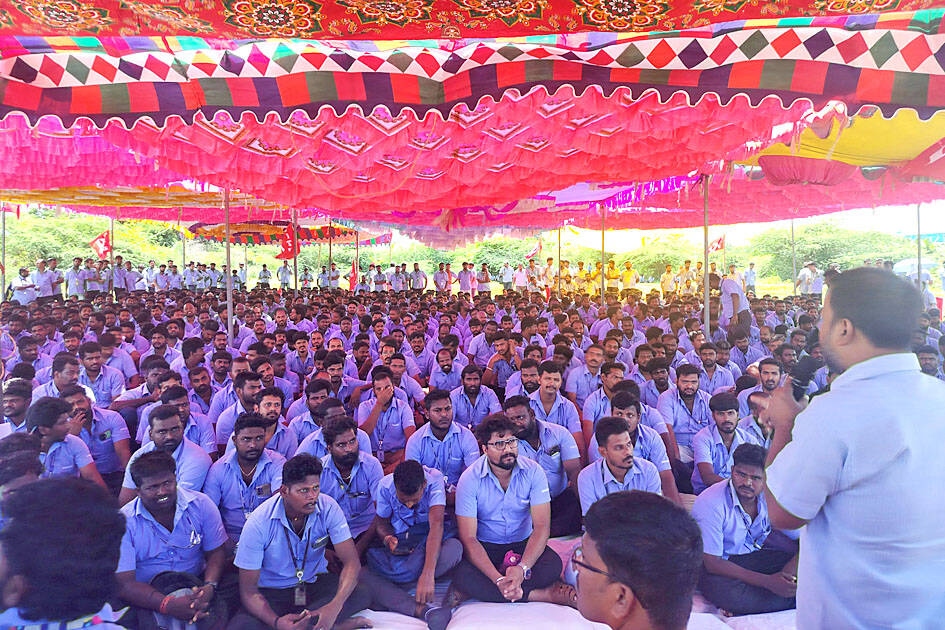Operations at Samsung Electronics Co’s plant in southern India were disrupted for a second day yesterday by hundreds of employees striking for higher wages, in a rare episode of labor unrest for the South Korean company.
The strike at India’s biggest consumer goods company comes ahead of the festive season. The plant is one of two factories in India, which Samsung counts as a key growth market.
Two sources with direct knowledge of the matter said it contributed 20 to 30 percent of Samsung’s annual revenue of US$12 billion in India.

Photo: Reuters
Posters reading “Indefinite Strike” went up outside the factory in Sriperumbudur near the city of Chennai, where hundreds of workers in company uniforms set up tents to shade them from the heat.
“We are striking for the second day,” union leader E. Muthukumar said.
About half of the factory’s daily production was affected when many workers stayed away on Monday, and the protest continues to press their demand for higher wages, better working hours and company recognition of the union.
Samsung India did not respond to a request for comment.
On Monday, a spokesperson said that the company actively engaged with workers “to address any grievances they may have and comply with all laws and regulations.”
Samsung employs about 1,800 workers at the plant, which makes items such as refrigerators, washing machines and televisions, while a bigger plant in the northern state of Uttar Pradesh turns out smartphones.
Workers are demanding equal remuneration for those with the same length of experience, at least half a dozen employees Reuters spoke to on condition of anonymity said.
One poster outside the factory exhorted state labor officials not to support the management, advising instead: “Discuss and solve demands from the labor union with union officials.”

Intel Corp chief executive officer Lip-Bu Tan (陳立武) is expected to meet with Taiwanese suppliers next month in conjunction with the opening of the Computex Taipei trade show, supply chain sources said on Monday. The visit, the first for Tan to Taiwan since assuming his new post last month, would be aimed at enhancing Intel’s ties with suppliers in Taiwan as he attempts to help turn around the struggling US chipmaker, the sources said. Tan is to hold a banquet to celebrate Intel’s 40-year presence in Taiwan before Computex opens on May 20 and invite dozens of Taiwanese suppliers to exchange views

Application-specific integrated circuit designer Faraday Technology Corp (智原) yesterday said that although revenue this quarter would decline 30 percent from last quarter, it retained its full-year forecast of revenue growth of 100 percent. The company attributed the quarterly drop to a slowdown in customers’ production of chips using Faraday’s advanced packaging technology. The company is still confident about its revenue growth this year, given its strong “design-win” — or the projects it won to help customers design their chips, Faraday president Steve Wang (王國雍) told an online earnings conference. “The design-win this year is better than we expected. We believe we will win

Chizuko Kimura has become the first female sushi chef in the world to win a Michelin star, fulfilling a promise she made to her dying husband to continue his legacy. The 54-year-old Japanese chef regained the Michelin star her late husband, Shunei Kimura, won three years ago for their Sushi Shunei restaurant in Paris. For Shunei Kimura, the star was a dream come true. However, the joy was short-lived. He died from cancer just three months later in June 2022. He was 65. The following year, the restaurant in the heart of Montmartre lost its star rating. Chizuko Kimura insisted that the new star is still down

While China’s leaders use their economic and political might to fight US President Donald Trump’s trade war “to the end,” its army of social media soldiers are embarking on a more humorous campaign online. Trump’s tariff blitz has seen Washington and Beijing impose eye-watering duties on imports from the other, fanning a standoff between the economic superpowers that has sparked global recession fears and sent markets into a tailspin. Trump says his policy is a response to years of being “ripped off” by other countries and aims to bring manufacturing to the US, forcing companies to employ US workers. However, China’s online warriors